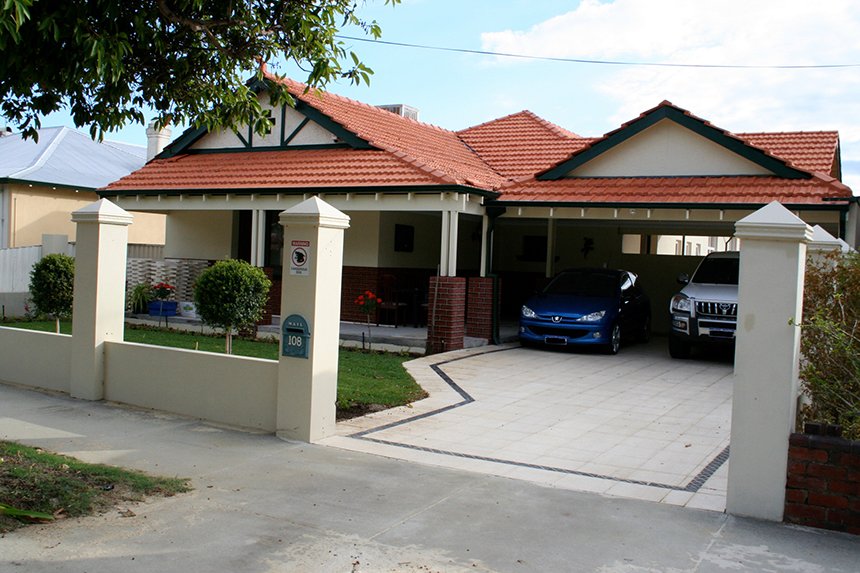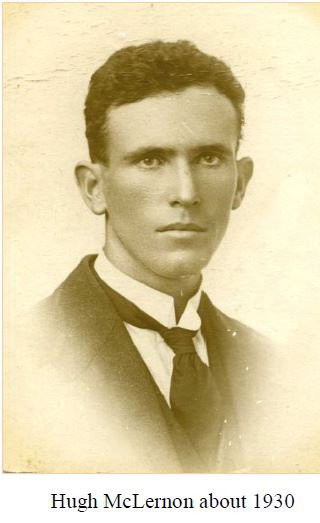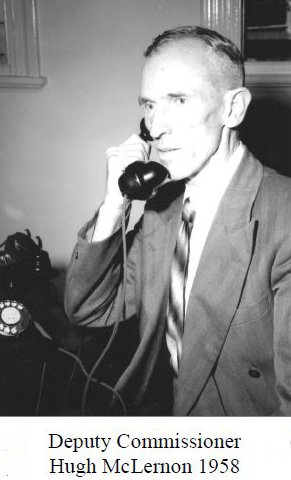THE MCLERNON FAMILY OF 108 FOURTH AVENUE MT LAWLEY
108 Fourth Avenue Mt Lawley, today
FROM COUNTRY POLICEMAN TO INSPECTOR (AND LEGEND) OF THE GOLD SQUAD AND DEPUTY COMMISSIONER OF POLICE
The Mount Lawley Society’s History Sub-Committee has been working with Plunkett Homes searching for the many early Plunkett-built homes in Mt Lawley, Inglewood and Menora.
After putting a call out through social media, we have unearthed over 120 Plunkett homes in Mt Lawley and Inglewood and have collected some gems of stories about the people who lived in them along the way. The home at 108 Fourth Avenue is one of these and the story of Hugh McLernon is one of these gems.
Hugh and Mary McLernon bought their new home (built in 1924 by Plunkett) in 1926 and raised their seven children there. Hugh started out in the Mounted Police in Perth, then transferred to Narrogin where he worked from 1922-1925. In 1925 he was asked to join the CIB where he worked for ten years. In 1940 he was placed in charge of the elite and highly regarded Gold Stealing Detection Squad in Kalgoorlie. He shone in this dangerous job and became the subject of Kalgoorlie legends and folklore. He was appointed an Inspector, then Chief Inspector and finally Deputy Commission of Police in 1958. He was also well known for ‘promoting better cooperation between police and social welfare officials in the outback’.
The McLernon family lived at 108 Fourth Avenue (on and off depending on Hugh’s postings) until 1944, but didn’t sell it until 1954. Hugh McLernon died in 1972.
With huge thanks to Peter Conole who wrote this story in his Between The Lines, the full family story starts here …
Hugh McLernon, the first son of Inspector John McLernon of the WA Police (see the June 2015 edition of ‘Between the Lines’) was born at Geraldton on March 10, 1899 and educated at various State schools as the family moved around WA in accordance with his father’s transfers. From about the year 1916 Hugh served in the militia. He was promoted to sergeant and company quartermaster in the 87th Battalion of Infantry from January 1, 1917. Soon afterwards he was commissioned as a 2nd Lieutenant and could have found his way into an active service World War I battalion. He chose not to and entered the State’s Public Service as a clerk in the important Water Supply Board (1).
Hugh received a better pay offer and went north to Pippingarra and Windimurra Cattle Stations, working as a jackeroo and horse breaker. When Hugh returned to Perth in 1920 he decided to try policing and signed up as a Probationary Constable on December 23, 1920. He did well and won appointment to Constable in March 1921. Hugh’s reputation for horsemanship meant that his first posting was with the Metropolitan Mounted Police, operating out of the Roe Street Stables. He left Perth for the more or less obligatory country service, which he undertook at Narrogin Police Station during the period 1922-1925. Hugh took a wife with him – he had married Marie Carr at Midland on March 11, 1922. They were to raise a family of seven, three sons and four daughters. Two of the sons, John Stephen McLernon and Kevin McLernon, continued the family tradition and joined the WA Police (2).
Marie’s family background is quite interesting in itself. Her grandfather John Carr was the son of a landed gentleman of County Cork named Edward Carr. John went to sea and flourished, eventually rising to master mariner and the captain of various merchant vessels operating around the world. He made some voyages to WA in order to collect cargoes of wood at Rockingham. One of his sons, John Thomas Carr, married Kathleen Bergin and settled in WA, where he worked as a railway signalman (3).
In March 1925 Hugh’s days as a uniformed man came to an end. His superiors saw him as a potential investigator and brought him back to Perth as a probationary detective. He emerged as Detective Constable Hugh McLernon of the Criminal Investigation Branch (CIB) and spent ten years in the rank, operating around the State as required. Good teamwork and total dedication delivered results. Hugh was meticulous and painstaking in his work and reached the rank of Detective Sergeant in May 1935 (4). Hugh was an active member of the Police Union and kept up to speed with educational matters. During 1937 he applied for the position of instructor at the Police School, only to lose out to Sergeant (later Inspector) William Harvey, a former Australian Army officer who won the Military Cross in World War I (5). In the course of 1939 Hugh was elected president of the Police Union but was not able to hold the position for long as onerous and testing duties were just over the horizon.
Everyone was aware of a pending new world crisis. Even before World War II broke out the Commonwealth Government moved into action to protect national security. In WA, Police Commissioner David Hunter formed a Special Bureau on August 25, 1939 and placed Sergeant Hugh McLernon in charge. His job was to survey and deal with extremist organisations, whether of the left or right. After war was declared in September, fascist, pseudo-nazi and communist political organisations active in the state were placed under scrutiny.
Hugh insisted – against some opposition – that the far left deserved the same treatment as the far right. At the time Nazi Germany and the Soviet Union were on friendly terms and had a peace pact, so he was quite correct. Hugh noted that when his operatives obtained documents from ultra-left wing sources they contained more copious and sensitive military information than from elsewhere – data that could have been treacherously passed on to agents of declared enemy nations such as Germany and Italy (6). The Commissioner of Police and other officials certainly appreciated his successes. He received a vote of confidence in October 1940 when he was placed in charge of the elite and highly regarded Gold Stealing Detection Staff at Kalgoorlie. Hugh, Marie and their family boarded the train and headed east in the same month.
Over the next twelve years Hugh McLernon carried out brilliant work for the famous Gold Squad of the era and eventually emerged as the subject of Kalgoorlie legends and folklore. He was very effective in shutting down gold theft rackets and illegal dealings on the fields. During one particular year he made 75 arrests and local shopkeepers expressed alarm because the quick decline in gold stealing reduced money in circulation. The detection work was complex and dangerous and had to be carried out with great secrecy, as some gold stealers were vicious thugs who had murdered police officers in the past (7). The Goldfields years made Hugh McLernon: he was promoted to Inspector on May 5, 1949 and called back to Perth in August 1952 to manage the CIB. He played a leading role in organising security arrangements for the Royal Tour of 1954. During that event he went to Kalgoorlie again to help escort the Royals. In October 1955 Hugh was elevated to the rank of Chief Inspector, a position which involved a lot of direct personnel management, including disciplinary cases (8).
On May 1, 1958 Hugh was appointed Deputy Commissioner of Police, second in rank only to Commissioner James O’Brien. He performed effectively and showed both diplomacy and tact in refuting lies circulated by a politically motivated journalist. In addition he moved with the times by promoting better cooperation between police and social welfare officials in the outback (9).
Within twelve months he decided to retire. Hugh McLernon left the WA Police on March 10, 1959, a move regretted by the commissioner who still, however, wished him ‘many well-earned years of peaceful repose’. He and Marie managed a farm south of Perth for years but spent time in Perth as the need or inclination arose. Hugh died at Safety Bay on September 20, 1972 (10).
Notes and References
(1) For Hugh’s police career, his personal file preserved in the State Records Office is an amazingly copious and informative package covering many aspects of his life. See SRO Acc 1065, AN5 10/16 H.McLernon, Reg.no1331 - application to join Police Force, December 1920. The document includes details of his military activities, his early working life and remarkable rise to fame in the WA Police, plus much personal data.
(2) See WA Police Records of Service of John Stephen McLernon (no 2077) and Kevin Cecil Hugh McLernon (no.2258)
(3) For a fuller account of the Carr family, see Verscheur, Mavis Random Recollections (Vanguard Service Print, WA, 1981), pp64-66
(4) WA Police Record of Service of Hugh McLernon, no 1331.
(5) SRO Acc 1065, AN5 10/16, H.McLernon, Reg.no.1331, application for position of Instructor, August 1937; Conole, P. Protect and Serve; a history of policing in Western Australia, (Western Australia Police Service, 2002), pp161, 220
(6) SRO Acc 430, 3797/39, Commissioner to Inspector John Doyle, August 22, 1939; SRO Acc 1065, AN5 10/16, H.McLernon, Reg.no.1331, folios 233-235; WA Police Record of Service of Hugh McLernon, no.1331. One recent account virtually ignores the shocking reality of the threat posed by the German-Soviet pact until 1941: Oliver,B. and Latter, W.S. in Gregory, J. On the homefront: Western Australia and World War II (University of Western Australia Press, 1996), pp179-180.
(7) SRO Acc 1065, An5 10-16 – numerous citations from the Chamber of Mines; Douglas, F.J. From Wool to Stolen Gold (Albany,1988), p84 and Battye Library Transcript of Interview with Gilbert Scott Handcock, p49
(8) WA Police Record of Service of Hugh McLernon, no 1331.
(9) Conole, op cit (2002), pp289-290, 314.
(10) WA Police Record of Service of Hugh McLernon, no.1331.



